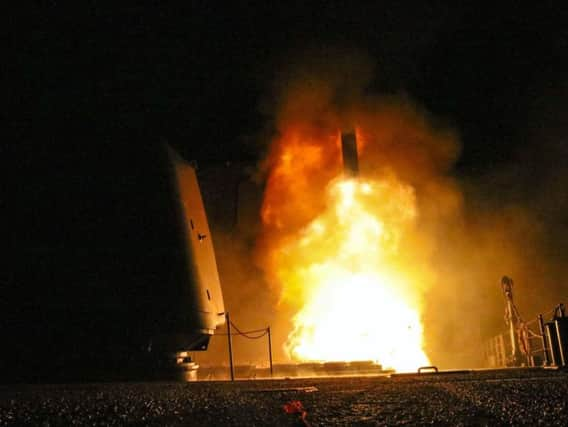What happens next will be worrying - a Yorkshire peace expert gives his take on the Syrian air strikes


Four Royal Air Force Tornados GR4s joined the co-ordinated missile strikes at 2am this morning (Saturday), launching Storm Shadow missiles at a base 15 miles west of Homs.
The strikes destroyed important infrastructure at three sites connected with the Syrian regime's chemical weapons programme. The first was at a scientific research centre in greater Damascus, involved in the development and production of chemical warfare. Other strikes targeted an army depot near Homs.
Advertisement
Hide AdAdvertisement
Hide AdThe Prime Minister insisted that joining the bombing campaign with the United States and France was the "right thing for us to do" in the wake of the "harrowing" assault on Douma a week ago.
Mrs May added the military action was "legal" and defended the decision to go ahead without securing the backing of Parliament - in a move which angered some MPs including Richard Burgon, the Labour MP for East Leeds and has sparked concern over what happens next.
Mr Burgon said: "Bombs will not save lives or bring about peace. Britain should not be engaging in a legally questionable military action. It should be playing a leadership role in creating a ceasefire and diplomatic solution in Syria, and Parliament should have voted on military action."
Akex Sobel, representing Leeds North for Labour added: "I think Parliament should have been recalled and had a vote. The Prime Minister will need to answer next week when Parliament reconvenes."
Advertisement
Hide AdAdvertisement
Hide AdFabian Hamilton, Leeds North East MP (Lab) was also critical. He tweeted: "More bombs will not bring about peace. The Prime Minister failed to consult Parliament before military strikes took place in Syria. The contempt with which she treats Parliament is shocking and demonstrates that she lacks any ability to lead."
And the opposition leader, Jeremy Corbyn who was in Huddersfield today, has questioned the legality of the military action.
He said: "I believe that Parliament should have been consulted and voted on the matter. The UK Prime Minister is accountable to Parliament, not to the whims of a US President.
"I believe the action was legally questionable, and this morning the UN Secretary-General has said as much, reiterating that all countries must act in line with the UN Charter."
Advertisement
Hide AdAdvertisement
Hide AdThe more long term consequences of last night's attacks are worrying and unknown according to a peace expert at The University of Bradford.
Prof Paul Rogers, Emeritus Professor of Peace Studies at the University of Bradford and a global security consultant with Oxford Research Group, has worked in the field of international security, arms control and political violence for over 30 years.
He told the Yorkshire Post: "I thought the government would go ahead because of the dangers of defeat in Parliament but I had not expected it until tomorrow (Sunday) or Monday night. I thought they would get more weapons in place. This was small scale which means they could do it. I expected something a lot bigger, it is quicker and smaller than I expected.
"It has crossed an important threshold and I would not like to predict what will happen in the next week or two. I don't know if the Regime will keep quiet and Russia now hide. I simply don't know and this is when interesting things happen which should not be surprising."